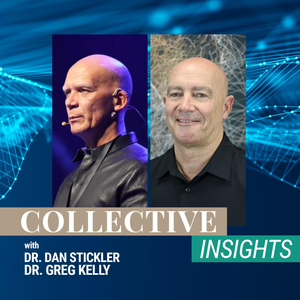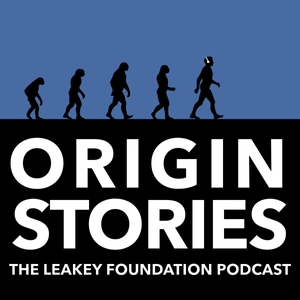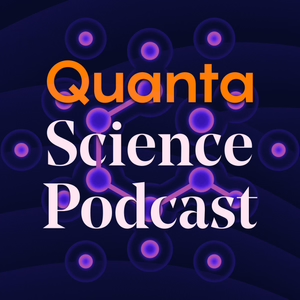
Welcome to the Brain Space Time Podcast!
02/06/23 • 5 min
In this short episode, I give a rough outline of what the Brain Space Time podcast will be about!
Timestamps:
(00:00) - What is the Brain Space Time Podcast about?
(01:39) - The podcast logo explained.
(05:28) - Getting in touch.
Links
Show notes for this episode (with Bergson's cone figure)
Henri Bergson's 1986 Matter and memory PDF (Cone figure on p. 61)
Uri Hasson on temporal receptive windows paper
Follow me
For updates on new episode releases, follow me on Twitter.
I welcome your comments, questions, and suggestions. Feel free to email me at [email protected]
If you are interested in my other work, click here to look at my other podcast, blog, website, or (ongoing) Bachelor dissertation on time perception semantic networks.
In this short episode, I give a rough outline of what the Brain Space Time podcast will be about!
Timestamps:
(00:00) - What is the Brain Space Time Podcast about?
(01:39) - The podcast logo explained.
(05:28) - Getting in touch.
Links
Show notes for this episode (with Bergson's cone figure)
Henri Bergson's 1986 Matter and memory PDF (Cone figure on p. 61)
Uri Hasson on temporal receptive windows paper
Follow me
For updates on new episode releases, follow me on Twitter.
I welcome your comments, questions, and suggestions. Feel free to email me at [email protected]
If you are interested in my other work, click here to look at my other podcast, blog, website, or (ongoing) Bachelor dissertation on time perception semantic networks.
Next Episode

#1 Georg Northoff: Spatiotemporal neuroscience
In the first episode of the Brain Space Time Podcast, I talk to Georg Northoff, a neuroscientist, psychiatrist and philosopher based in Ottawa, Canada. Georg argues that the self and time are fundamental to how the brain constructs a model of the world. We start off with the role of spontaneous activity in the brain, including the role of the default mode network, although Georg might convince you that you shouldn't think of it as one of many networks but as a baseline. We also dig deep into philosophy, going back to Kant, Leibniz and even Heraclitus. Georg argues that we should drop the mind-body problem, and move to the world-brain problem instead. Central to the world-brain problem is the ability of our brain to match the temporal-spatial statistics of its environment, "aligning with the grove of the music"; as Georg would say. Here we get into physics territory by discussing this matching mechanism in terms of self-similarity, scale-free dynamics, and the differential effects of pink and white noise on the brain. Evolution is also a recurring theme, as we get into the types of self across species, long-distance navigation of whales or ask how the temporal statistics of neuronal activity are conserved across species despite them having varied ecological niches. A big part of the episode is on time perception and temporal scales, exploring how time perception is too slow for depressed patients or how our breathing and heart rate are reflected in neuronal and mental dynamics. Finally, Georg tells us about the benefits but also struggles of his interdisciplinary career trajectory.
Shownotes and mentioned figures available at:
https://akseliilmanen.wixsite.com/home/post/pod01
Timestamps:
(00:00) - Intro
(02:54) - How did you get interested in time and the self
(06:31) - Spontaneous activity as psychological baseline of the brain
(13:14) - Default mode network, cortical midline structures, and the self
(17:04) - Interoception, bodily self across species and mirror-self recognition
(25:21) - From mind-body to world-brain problem, dissolving philosophical concepts (i.e. Élan vital)
(38:25) - Why physicists get spatiotemporal neuroscience and working memory psychologists don't
(44:28) - The brain matches the spatiotemporal statistics of its world
(54:05) - Scale-free dynamics and the neural response to white/pink noise in conscious/unconscious states
(01:01:25) - Neuronal rhythms across species (Buzaski), temporal receptive windows (Hasson)
(01:17:35) - Time perception & time scales in heart rate and breathing
(01:27:49) - Time perception impairment in depression and mania
(01:31:51) - Time perception & time scales - how to manipulate/disentangle them
(01:37:20) - Difference based coding - bigger than predictive coding?
(01:43:05) - Interdisciplinary career trajectory - benefits & challenges
(01:56:25) - Advice for computational neuroscientists
(02:01:04) - Where is spatiotemporal neurosciences in 10 years & what are the challenges
Links/Books/Papers
Georg Northoff website
Book: Neurowaves - Brain, Time and Consciousness (2023) URL
Book: The Spontaneous Brain (2018) URL
Textbook: From Brain Dynamics to the Mind: Spatiotemporal neuroscience (2023 - pre-order) URL
Self and cortical midline structures (2004) paper
Heart, lung, and brain - Josh Goheen (2023) paper
Brain and intrinsic neural timescales paper with Mehrshad Golesorkhi (2023) paper
Spatiotemporal neuroscience as 'common currency' (2020) paper
Why Spatiotemporal neuroscience (2020) paper
Are object relations temporal? (2022) paper
Leibniz and dynamic time (2019) paper
Marcus Raichle- default mode network 2001 paper, 2015 paper
Gyuri Buzaski (2013) - neuronal rhythms across species paper
Uri Has...
If you like this episode you’ll love
Episode Comments
Generate a badge
Get a badge for your website that links back to this episode
<a href="https://goodpods.com/podcasts/brain-space-time-podcast-426784/welcome-to-the-brain-space-time-podcast-58748641"> <img src="https://storage.googleapis.com/goodpods-images-bucket/badges/generic-badge-1.svg" alt="listen to welcome to the brain space time podcast! on goodpods" style="width: 225px" /> </a>
Copy




